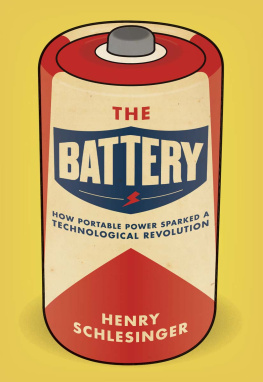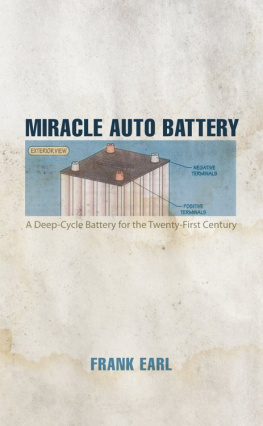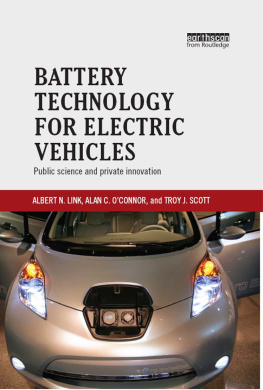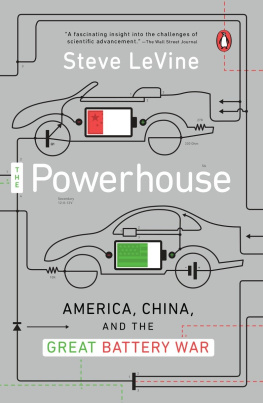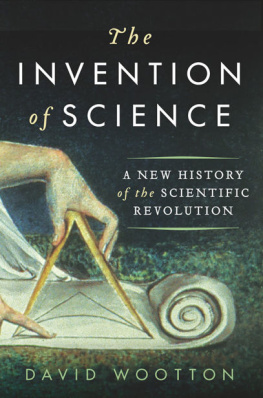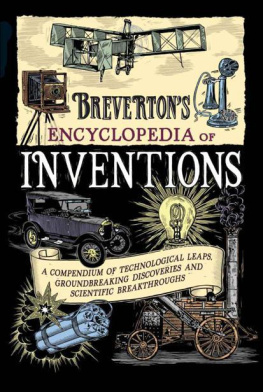To Elisabeth Dyssegaard, Kathryn Whitenight, Jud Laghi, Charlie Scuilla, and Melissa Suzanne, for their patience.
Id also like to thank all of the people who helped me along the way. Theyre a diverse group, and Im certain that Ive inadvertently missed some of them. However, I am grateful to the assistance given to me by Susan Hendrix, Larry Steckler, Tracey Thiele, Dennis Klein, Janell Mirochna, Mindy Rosewitz, Wendy Rejan, Corey Crell, and Donna Frazier Schmitt. And, of course, to Chris Costello, for his most excellent illustrations.
Faith is a fine invention
For gentlemen who see;
But microscopes are prudent
In an emergency!
Emily Dickinson
History in Real Time
Nothing is too wonderful to be true if it be consistent with the laws of nature.
Michael Faraday
T his book has something of an unlikely origin. It was during the course of working on a book about espionage that I became interested in batteries. Because changing the batteries of a piece of spy gear in the field is often inconvenient, if not altogether impossible, power sources are considered a critical component when it comes to intelligence gathering. The engineers and scientists who dream up all the fancy spy gear spend a lot of time worrying about batteries. While surprising, it also made perfect sense. James Bond was never seen popping into a drugstore for a couple of AAs to power up his gadgets, but something had to power them.
The espionage book was a lengthy project, but during my downtime I began making notes about batteries on small index cards. One slim stack of cards very quickly turned into two, then grew into four, and soon expanded into eight. The answer to each question seemed to prompt four more questions. Clearly there was more to batteries than we generally realize.
A little more research revealed that there was almost nothing written about batteries for the nontechnical reader. Of course, its possible to find individual books on the chemistry, physics, history, and electronics of batteries, but these are overwhelmingly intended for technical or scientific professionals and academics. They are almost always very narrowly focused and, to be perfectly blunt, pretty dry stuff. Conversely, the vast majority of breathless prose churned out about consumer gadgets touches only briefly on the topic of batteries. All the action is in the user interfacethe display, the keypad, the speed, and the apps. By comparison, batteries are generally regarded as somewhat dreary necessities. Even the most diehard tech geeks I know have a hard time mustering enthusiasm for battery technology.
T HE FACT IS, BATTERIES NOT only power our current technologically advanced and portable age, but are also largely responsible for virtually all of the early basic scientific research that made todays gadgets and gizmos possible. Batteries quite literally powered much of the basic science that led to the consumer technology they power today. Without batteries, not only would our cell phones and other gadgets not work; in all likelihood the technology on which they are based would not exist. This is the kind of elegant, circular dynamic that is irresistible to a writer.
However, there is another important aspect. Since batteries are an enabling technology, its impossible to understand their significance without providing scientific, historical, and technological context. In writing this book there was very much a sense of being let loose in historys candy store. Pick a subject, from home appliances to the worlds battlefields, and youll find batteries powering up an increasingly sophisticated technology.
And there were more surprises. From the very beginning, literally within weeks of publication describing the first modern battery in 1800, scientists began making improvements on the initial design. The quiet, steady evolution to increase battery power and extend life started before they even understood exactly how they worked or the true nature of electricity.
The intent of this book is to draw together those disparate and seemingly unrelated elements to tell the story. If there are detours, it is only because the facts uncovered were either too interesting or too much fun to leave out. As an author, Id like to believe this is the first book in which Wolfman Jack, Michael Faraday, Lord Byron, and the band Metallica appear between the same covers.
A World without Science
Any sufficiently advanced technology is indistinguishable from magic.
Arthur C. Clarke
I n the early 1800s, the Danish curator and archaeologist Christian Jrgensen Thomsen hit on a novel idea for classifying prehistory artifacts. By dividing them into three categoriesStone Age, Bronze Age, and Iron Agehe was able to make some sense of his museums collection and shed light on civilizations long vanished. What he had done, of course, was create a technological time line with each of the three classifications defined not only by materials, but also by technical skill sets and accumulated knowledge base. Although modified over the years, Thomsens three-age system has more or less withstood the test of time.
A hundred years later, F. Scott Fitzgerald would puckishly coin the phrase Jazz Age to define the gaudy up-tempo spree of music, money, bathtub gin, and flappers that defined the decade-long party following World War I. Today were told we live in the Digital Age, Wireless Age, and Portable Age, though we have yet to come up with a suitable name for the current convergence of all three.
There is a certain appeal in measuring history against the steady advance of science and technology. For one thing, it provides a welcome relief from the tame textbook pageants of politics, personalities, wars, and dates or the sour revisionist history in which flaws overshadow accomplishments currently in favor. And, with few exceptions, science and technology tend to progress in an orderly, logical manner. The time lines are remarkably clear, even in the ancient world.
As far back as 600 BC, Thales of Miletus was already exploring the mysteries of nature. Known as one of the Seven Wise Men of ancient Greece and the father of modern mathematics, Thales left no writing. All that exists of his work are scattered anecdotes from Plato and Aristotle. But even this anecdotal evidence shows the first tenuous, unsteady steps of scientific thought.
In a legend that uncannily parallels the stereotype of the modern absent minded professor, Thales was said to have tumbled into a well (in another version its a ditch) while contemplating the stars. And during a military campaign against Persia, he supposedly diverted the Halys River (the present-day Kzl Irmak River in Turkey) by ordering a channel to be dug that allowed a bridge to be built. While in Egypt, Thales was also reputed to have cleverly worked out a way of calculating the height of the pyramids by measuring their shadows on the ground at the time of day a mans shadow is equal to his actual height. A neat trick indeed!
Thales methodology was simple observation and reason. It was not science in the modern sense of hypothesis and experiment, but rather science based on what was immediately observable. Still, it was founded on logic and was a significant break from the received wisdom of religious myths that permeated ancient thought. For Thales, nature was neither random nor subject to the whim of the gods. This was a major step forward to be sure, but painfully inadequate when it came to understanding complex natural processes and those things either too large or too small to be seen clearly. Even Thales faced insurmountable problems when it came to studying simple electrical and magnetic phenomena.
For instance, amber, fossilized tree resin, was prized in the ancient world particularly among the Greeks, who called it 

